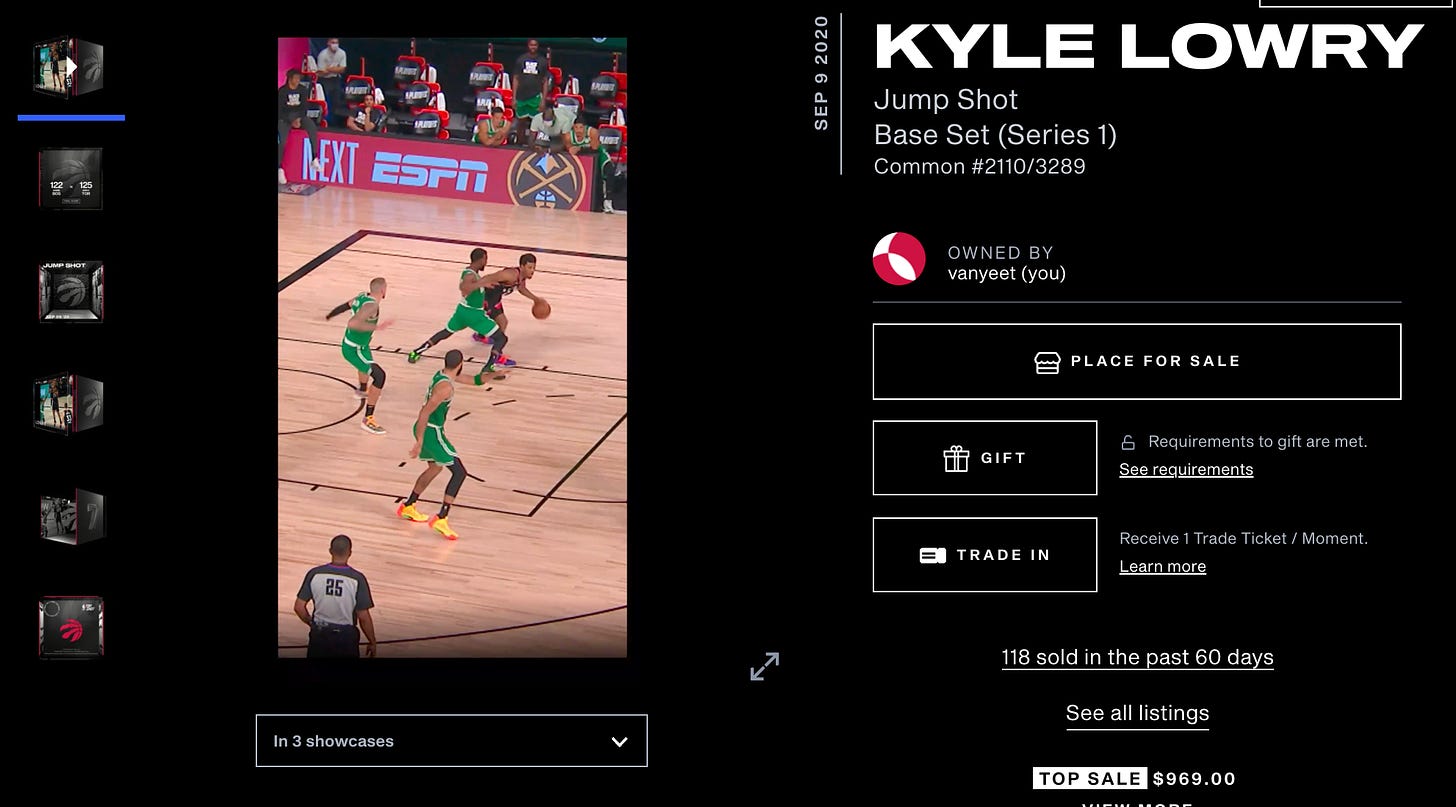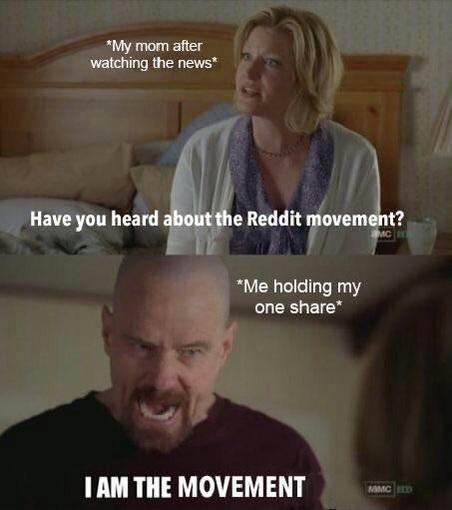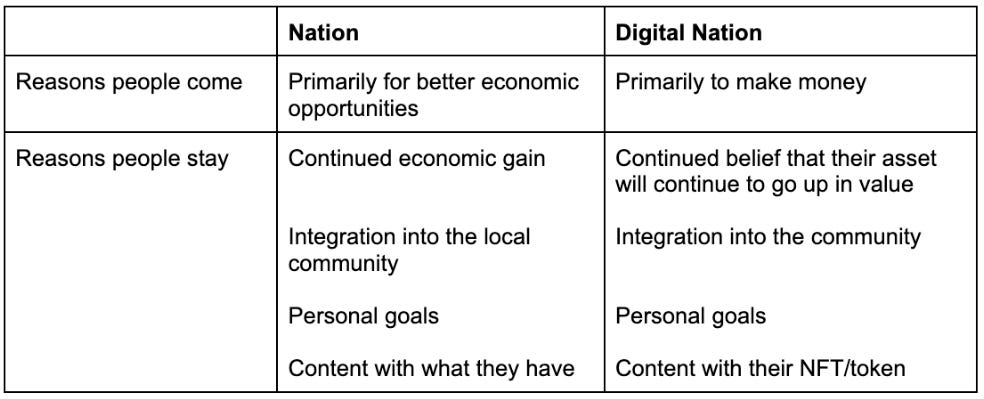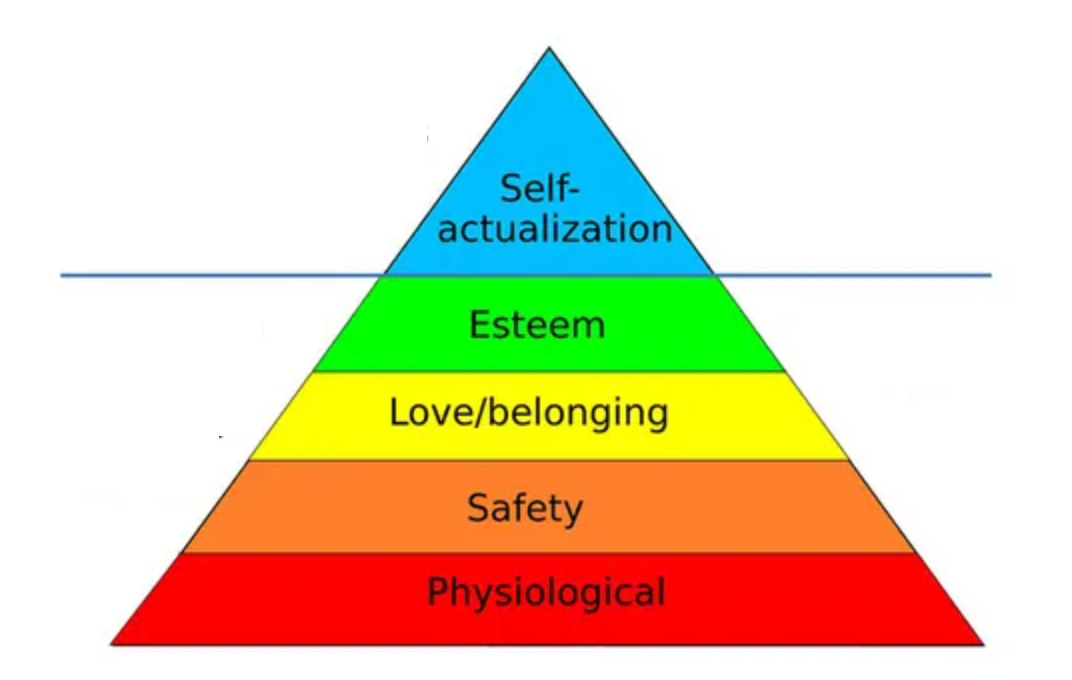Background
The first NFT I ever bought was a Kyle Lowry moment on NBA Top Shot. It was his game winning play against the Celtics in 2020, a moment that I’ll never forget because it was his last playoff win as a Raptor.
I loved my NFT, but I couldn’t clearly articulate why I bought it and why my friends bought them as well. This led me down a web3 rabbit hole where I sought the answers to these questions.
Ever since I heard of NFTs and tokens, I’ve been struggling with forming a mental model on why people buy them. I needed a framework to explain the $200,000 floor price of Bored Apes, the sense of camaraderie with my friends that I felt when I signed up for NBA Top Shot and the heated online debates about which blockchain is superior. The goal of this article is to describe my mental model for this space to help people understand and build new experiences for it.
I believe that the concept of a nation can be compared with communities that are made up of NFT or fungible token holders. Both are constructs made by people to create structure within groups of people. I’ll highlight some similarities and differences between the concept of a nation and a crypto community. My belief is that the concept of a nation1 provides a better framework to understand and evaluate these communities compared with traditional views of web products. It’s more accurate to compare Bitcoin with a nation like France rather than comparing it with an app like Facebook.
What is a Digital Nation?
To understand what a Digital Nation is, we need to first understand what a nation is and how they came to be.
The concept of a nation state dates back to 1638 with the Treaty of Westphalia. It was a human-made tool created to establish borders and world order during a time of conflict and war. A nation is a group of people that have common values and culture located in the same geographical area. A state (or country) is a group of people with self sovereignty over their land and people. For the rest of this article I will refer to nation states as nations for simplicity.
France is considered one of the earliest nations and consisted of people who shared common history, spoke the same language and lived in the same part of Europe. Though people are united in culture they have their own individual distinct goals and desires. Some people immigrate to a nation to live a better life economically, while others might do it for personal or ideological reasons. While people can travel between nations, they generally reside and spend time in a single one.
Crypto communities are groups of people that hold a particular NFT like a Bored Ape or a fungible token2 like GME. They share common qualities with nations, so we’ll define them as Digital Nations. Digital Nations are a group of people that have common values and culture who spend their time in the same online places together. They may not physically live in the same area, but they believe the same things, use the same language (memes) and spend time in same apps together.
Membership in a Digital Nation is determined by how bought in a person is into the community. The easiest way to members to determine this is whether a person is an owner of the necessary NFT/token. Active participation and engagement in the community is a signal in interest, but ownership is a signal of commitment.
It’s important to note that an NFT or token by itself does not make it a Digital Nation, in the same way that a piece of land isn’t a nation. Digital Nations are active communities with shared beliefs that are anchored by NFTs and tokens. It’s the people around the asset that gives it value and meaning.
Like nations, individuals within Digital Nations have varying goals including making money and spending time with other people. While people can buy and sell tokens easily, finite attention and capital limit the number of communities that people can actively participate in.
Isn’t this just social media?
The internet made information freely accessible and social media made it frictionless to connect you with anyone on the planet. Though we are exposed to many more people on a daily basis, the lasting relationships that we form with them are usually shallow and limited. Similarly the ideas and thoughts that we encounter online are plentiful but fleeting.
Among many differences, here are 2 distinctions between Digital Nations and social media apps:
A Digital Nation is more than just a website. When r/wallstreetbets was removed on Reddit, a part of the community started a new server on Discord together. When the Discord server was banned, others servers were created. A Digital Nation is more than the app that they use in the same way that a nation is more than just the location of the people. Belief systems and the strength of the community are key differentiators.
A deeper sense of belonging. The people in a Digital Nation are significantly more bought into the community and its success. The relationships between people here are on average more authentic and meaningful. Consider how the people of r/wallstreetbets refer to each other endearingly as fellow apes and are willing to share intimate stories of their hardship.
Removing a subreddit doesn't end the Digital Nation; it exists beyond a single app and has a tighter knit community than a subreddit.
It’s important to note that Digital Nations don’t replace social media and the internet as we know it today; it builds on top of it. Without social media, people don’t have a way to find other people with similar interests and get exposed to new ideas. Social media makes it possible to form Digital Nations.
From user needs to citizen needs
Why do people buy NFTs? To understand why people join Digital Nations, we need to acknowledge and understand that individuals in a nation have different goals and desires. Beyond basic physiological necessities, here are a few:
Become wealthy and famous
Have a sense of belonging
Achieve personal goals
Be content with what they already have
This gives us a starting point for understanding why people join crypto communities. We can look at it in 2 ways: why people join and why people stay.
A reason that people immigrate to a nation is to seek better economic opportunities for themselves and their families. I think Digital nations offer a similar value prop: financial upside. Price speculation is the mechanism by which prospective users become aware of a Digital Nation and consider buying into it. It is a tool to attract citizens to a young nation.
This isn’t necessarily the same reason that people stay in a Digital Nation, which is the equivalent of holding onto an NFTs or tokens. While the prospect of their asset going up in value is a large factor, people also point to other factors. Here are a few of them:
The feeling of community and the value of having more authentic and real conversations with others
The desire to collect a set of NFTs. NBA Top Shot has Sets that track and reward your collection progress.
The intrinsic value of the asset itself. Digital art like Art Blocks are valuable by themselves
These factors share common elements with the reasons outlined above for what people desire in a nation. Thus, looking at people’s desires and motivations in a nation can serve as a starting point for understanding why people join crypto communities and what the value proposition of these communities are. Price speculation is a growth mechanism while a welcoming community that helps you achieve personal goals is a retention mechanism.
What makes a successful Digital Nation?
Determining a single metric to assess the success of a Digital Nation is as difficult as determining what success is for a country. Though challenging, we can use the mental model of a nation to explore some options that free us from traditional metrics used with web products.
The success of a Digital nation can be measured by looking at the number of active members. Web products will measure daily active users (DAU) and optimize for engagement of registered users. For Digital Nations, I believe we should instead measure daily active holders (DAH). This is a measure of the number of people who hold an asset and who are actively engaged within the community whether in product or else where on the internet. The more active a user is, the less likely they will want to sell their NFTs and exit the community. A person that engages with others in their community frequently might be more likely to hold their NFT even during fluctuating prices movements. We see this behavior already with profile picture projects; as the NFT becomes a part of their identity and people become attached to their community and less willing to sell.
Here are a few more to measure and monitor:
Gini coefficient: measure of wealth gap
Market cap: measure of how desirable it is to join
Treasury size: measure of the wealth of the community
There’s also signals that are challenging to measure but are equally important like community sentiment and happiness.
What about real nations?
Digital Nations don’t replace physical nations, they build on top of it. Thus, it’s worth comparing the two to understand the distinct needs they serve and how they are different.
Human needs tend to layer on top of one another, as Maslow’s hierarchy of needs describes. Foundational survival needs like food shelter and clothing must be met first. This is followed by safety needs like physical and financial security which provides a sense of predictability and order.
Nations provide these foundational needs through their military and welfare programs. These systems are not perfect but provide basic human needs to their people. While nations strive to create a sense of belonging for their people, there are signs of its declining value. Our desire to seek belonging in online communities becomes easier to accept when you consider that faith in existing social organizations is declining.
Digital Nations build on top of foundational human needs and focus on 2 things: a sense of belonging and self-esteem. They give us ways to build self-esteem and accomplishment. Luxury NFTs like Bored Apes give us prestige and status. ANIMO NFTs give us a sense of accomplishment when we complete the assembly of a mech.
It’s critical to observe that belonging and self-esteem needs arise only after foundational ones are met. Without basic human needs met, none of the higher order ones matter. When they do arise, Digital Nations give us a way to address them
While there are many parallels between Digital Nations and real world nations there are differences that stretch the limit of the model.
Crypto citizens can be part of many nations. People typically are citizens of only one or two countries while it’s possible to own thousands of tokens giving access to various communities. That being said, attention and capital is limited, so it’s likely that people will focus their time and money on a select set of Digital Nations.
Crypto citizens can immigrate easily. While immigration paperwork can take years, buying a token takes seconds. Switching Digital Nations is near frictionless. Furthermore, most most people are born into citizenship whereas people must immigrate to join Digital Nations.
The consequences of a failed nation for are drastically different in both models. The effects of a nation collapsing are devastating while a crypto community failing has mostly wealth implications for its citizens.
One interesting commonality is tribalism. Digital Nations provide a new dimension to divide people, and are layered on top of existing physical divisions. We see this already with people argue about which blockchain is superior (Maxis). It’s likely that a sense of tribalism will continue to exist with Digital Nations.
What do we do with this?
The analogy of a nation provides a useful model for people that are building in this space, including engineers, entrepreneurs and investors. Here are a few principles to consider:
Treat people as citizens, not users
Recognize that people have different individual goals within their community
Create systems that enable citizens to benefit from the success of the community
It’s also imperative to be aware of the negative implications of this technology. Here are 2 considerations:
Super bubbles: If the internet created echo chambers and bubbles that reinforced our beliefs, then Digital Nations create systems that financially incentivize common thinking and unified action. This has the power to be a force for good or bad. I’ve coined this term a “super bubble.” We should learn from our lessons from social media and find ways to self-moderate and restrict bad actors early. If you’re designing incentive structures, be aware of the the direct consequences it might have on how the community will collectively act.
Gated access: Digital Nations require people to have internet access and the financial means to buy in. There’s a few ways we can try to address this problem. We can build social systems that provide ownership for people that are sufficiently active within a community, reducing the need to buy in. We’re already seeing this happen with some DAOs that give opportunities to people who don’t hold tokens but regularly participate and engage in town hall discussions. Furthermore, we should build communities that have a range of price points to make it easier to buy in. For example, you can buy an NBA Top Shot moment for just $2 today
Closing thoughts
Web3 won’t replace the internet and Digital Nations won’t replace nations. Like most forms of technology and social organization, they build on top of each other. In writing this article the analogy of space exploration came to mind. Maybe it works well or maybe I’ve been watching too much of The Expanse, that’s up to you to decide:
The digital revolution gave us a new planet. Computers gave us homes. The internet gave us roads and tools to mine natural resources. Crypto gives us nations.
Balaji Srinivasan has spoken about a related concept called the Network State. I see this as the next evolution of the Digital Nation, where communities begin to influence the real world and purchase land. For a deeper dive on this idea, you can read here.








